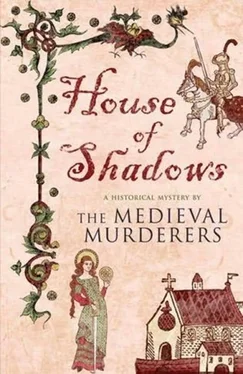But Geoffrey’s recollections of the prior’s words were interrupted by a shout from outside. Then an answering shout. Then another and another. Not good-natured banter this time but real insults flowing between the workmen who were repairing the crumbling stone at the base of the gatehouse wall. Whereas before the sporadic chatter hadn’t been audible, it was now all too plain. You’d think, wouldn’t you, that workers in a priory would have more respect for their holy surroundings? But no, it was all ‘hog’s turd’ this and ‘bull’s pizzle’ that. None of Chaucer’s business, but that was all the more reason to take a look.
Glad enough to be disturbed in his work – and at the same instant thinking, Work? What work? – Geoffrey rose from his stool and pushed the table slightly to one side so that he could get a clearer view out of the window. The downward angle was awkward, and he could at first see only a couple of workmen, hats pulled low over their brows to shield them from the sun, which was hot and high even this early in the morning. Chaucer could tell nothing more about them except that one seemed young, scarcely more than a lad.
The workmen were watching something out of Chaucer’s line of sight. They stood, tense and expectant. Geoffrey recognized the stance of people on the edge of an imminent fight, wondering whether to weigh in, wondering whether to get involved or to separate the participants. Then two more men, out of view until now, shifted further away from the base of the wall. They were facing each other, a couple of yards apart and at a half-crouch. From his position by the window, Geoffrey couldn’t see the expression on their faces, but their closeness to a fight was evident from their stance and the way in which each was clutching an ordinary tool – a chisel, a trowel – so as to turn it into a weapon if necessary. The man holding the chisel had the use of only one hand. The other one, his left, was withered and turned in on itself like the claw of a bird. Perhaps in compensation, all his strength and force seemed to be concentrated in the good hand and arm.
Geoffrey looked beyond the group of four. The area south of the gatehouse, the inner court, was empty apart from a black cat slinking through a patch of sun between the shadows. But there were no black-habited monks walking – or slinking – anywhere. Not surprising, since the bell that had just rung was for terce, already the fourth of the day’s devotional calls even though it was still early in the morning. Chaucer squinted into the sun-dazzled yard, willing someone to appear and intervene. Now the one-handed man raised his implement, the chisel. He was shorter than the other but looked the more dangerous. He shifted his weight on to his right foot, ready to attack.
Geoffrey leaned further out of the window. Without thinking, he shouted out. Not ‘Stop it!’ or ‘What do you think you’re doing?’ Simply: ‘Hey!’
It was enough. The man wielding the chisel looked up. The sun was in his eyes. He squinted, but Chaucer must have been no more than a shadow in the window. The man’s mouth opened as if he was going to say or shout something in reply – it was a black hole of a mouth, with fewer teeth than he had good fingers. But whatever this individual had been about to say he thought better of. He lowered the chisel and shook his head, perhaps as a way of denying that he’d ever meant any harm. The second man, too, looked up before letting the hand holding his implement, the trowel, fall to his side. The two onlookers were also gazing in Chaucer’s direction.
He felt that something more was required of him but couldn’t think what to say. After all, an argument among the lay workers in Bermondsey Priory was none of his business. He was a guest in this place, with no authority over any of its occupants. It was enough if he had reminded these people that he was a witness to their goings-on and so managed to avert violence for the time being.
‘Good day to you,’ he said, withdrawing from his place at the window.
But Geoffrey stayed close to the window. He heard the beating of his heart. His breath was coming short, as if he had been on the verge of a fight himself. He strained to listen. Nobody was speaking as far as he could tell. It was the silence that follows a quarrel. After a few moments the sounds of work resumed, the scrape of the trowel, the thunk of a hammer.
He sat down at the table once again and picked up his pen. To work! Geoffrey Chaucer was supposed to be penning a report on some recent negotiations in the city of Genoa to do with the establishment of a trading centre for the Genoese on the south coast of England. The success of such diplomatic missions was measured by the amounts of paper they generated. But, in truth, the writing of the report was a pretext. What Geoffrey really wanted to do was to get back to writing his verses.
But the scene outside had unsettled him, and whereas before he hadn’t wanted to concentrate, now he wasn’t able to for thinking of the foursome by the gatehouse entrance. He hoped that the monks would soon finish their devotions in the great church and that one or two of them would appear, black-hooded strollers in the court. Their very presence would surely be a deterrent to any further trouble. If they noticed what was going on, that is. The Cluniac monks at Bermondsey Priory had a reputation for scholarship. They weren’t like some orders, taking pleasure in hard sweat and calloused hands. Rather, they left that to the lay workers, like the quarrelsome individuals outside the window. They were the only ones privileged to get their hands dirty.
And a thought occurred to Geoffrey. Wasn’t it rather odd that a man with a crooked hand should be employed as a mason, repairing a cavity in the fabric of the gatehouse? Although he might be able to use a trowel and perhaps shift blocks of stone, he could not wield a hammer and chisel (other than as weapons). Perhaps his continued employment was an act of charity on the part of the monks. Except that the last thing the crooked-hand man looked as though he’d require was charity.
Shrugging his shoulders, Geoffrey picked up his pen yet again and lifted a sheet of paper from the pile in front of him. Get going. You write verses, he told himself; you’re a maker. Well, make something. That was evidently the reputation he’d brought with him to this priory. It was with these words that the prior, Richard Dunton, had greeted him the previous evening. ‘Ah, Master Chaucer, the court poet.’
The court poet? Chaucer had never thought of himself like that before, or more precisely he had never heard himself referred to in that way. True, he’d written a piece in memory of John of Gaunt’s first wife, and from time to time he recited his work to some of the nobility at the Savoy or at Windsor. The ladies and gentlemen seemed to appreciate his words. At least they applauded politely when he’d finished. And his invitation to spend a few days at Bermondsey had come about because of Dunton’s links to the various royal households. But to be termed ‘the court poet’ now, as if it was an official title! Despite himself, he felt a little kick of pride.
Richard Dunton had personally escorted Geoffrey on a tour of the priory. This was an old foundation, he’d explained, dating from shortly after the Conquest. The conventual church loomed above the cloister, the upper reaches of it like a great cliff catching the declining rays of the sun. It had taken years, decades to build, and had been completed and dedicated within living memory, yet it might have stood on this spot for centuries. Dunton’s deep voice echoed as they made a circuit of the cloister. The area in the centre was in shadow, and martins threaded the air between their nesting places among the eaves and buttresses. Geoffrey soon realized that the prior had his own kind of quiet satisfaction. He was the first Englishman to be appointed to the position of superior. He was new, he was relatively young, and there was vigour in his words and movements.
Читать дальше












